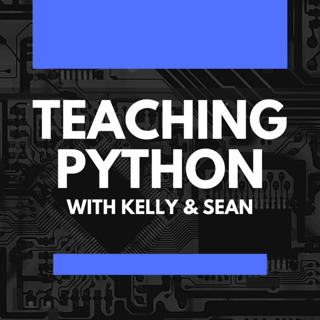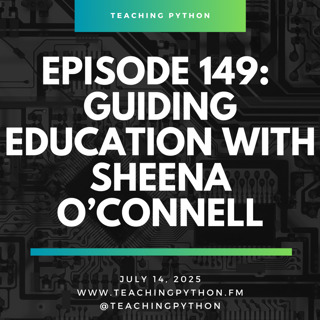
Episode 55: Unfiltered Friday Conversations
Kelly and Sean flip on the voice recording app and record a random Friday afternoon conversation about teaching approaches for computer science. What makes student learning the most effective?
14 Nov 202016min

Episode 54: Making Projects Happen with Eric Matthes (@ehmatthes)
Sean and Kelly invite Eric Matthes, teacher and author of Python Crash Course to discuss student projects in computer science. Eric was with us on Episode 33 (https://www.teachingpython.fm/33) and we ended the episode with discussions about completing projects and programming with purpose. In this episode we discuss finding a project, separating academic and project success criteria, helping student coders find a project, how to deal with failure, and some examples of great projects for learning. Special Guest: Eric Matthes.
10 Nov 20201h 14min

Episode 53: Developing for Mobile, the Web, and Desktop with Russell Keith-Magee ( @freakboy3742 )
This week's guest is Russell Keith-Magee from the Beeware project. Our conversation this week is about teaching students Python with native desktop applications, mobile, and the web. Plus, why do we have to use the command line? And do coding books from the early 80s hold up in Python? Django core developer and the founder and maintainer of the BeeWare project Former president of the Django Software Foundation BeeWare is a collection of tools and libraries for developing desktop and mobile applications; BeeWare aims to make it easy to write a native application for macOS, Windows, Linux, iOS, or Android that you can then distribute to end users as an installable app. BeeWare isn't a single tool or library - it's a collection of projects that can be used to help develop, debug, and launch Python software. Each tool follows the Unix philosophy of doing one thing well. Each tool can be used in isolation, or they can be chained together to provide a rich set of programming tools. Special Guest: Russell Keith-Magee.
27 Okt 202057min

Episode 52: Teaching the Full Stack with Ali Spittel (@alispittel)
Sean and Kelly invite Ali Spittel to talk about how teachers can go beyond their first programming language and help students learn to create more robust projects. If you’ve started with Python, how do you learn HTML, CSS, and JavaScript to make a front end for a project? Or vice versa? Ali is a Senior Developer Advocate at AWS, the co-host of the Ladybug Podcast, and a frequent tech writer and speaker. She has been employed in the tech industry since 2014, holding multiple software engineering positions at startups and a Distinguished Faculty and Faculty Lead role at General Assembly's Software Engineering Immersive. Special Guest: Ali Spittel.
20 Okt 202059min

Episode 51: Engaging Your Students With The Right Language Featuring @jolson_codes
Sean and Kelly invite Jeff Olson (@jolson_codes) to the show. Let’s take a look at language in the Computer Science classroom and focus on how we can put our students first by engaging them in the “right language for their learning.” Special Guest: Jeff Olson.
8 Okt 20201h 2min

Episode 50: Teaching Robotics With Python
This week, Sean & Kelly discuss how they are using Python to teach robotics in middle school, including the hardware and software it takes to get students thinking about how robots sense, process, and move in the world. With coronavirus precautions in place, our traditional approaches to robotics competitions through organizations like FIRST Lego League have been put aside. We're using this as an opportunity to get back to basics and teach students about sensors, servos, Python code, and more.
30 Sep 202030min

Episode 49: Python Tutor with Philip Guo
This week, Kelly and Sean interview Philip Guo, associate professor of cognitive science at UC San Diego. As a grad student in 2010, Philip created Python Tutor (https://pythontutor.com), the most widely-used program visualization tool for education. Using this tool, teachers and students can write Python programs directly in the web browser (without installing any plugins), step forwards and backwards through execution to view the run-time state of data structures, and share their program visualizations on the web. Over ten million people in more than 180 countries have used Python Tutor to visualize over 100 million pieces of code, often as a supplement to textbooks, lectures, and online tutorials. Special Guest: Philip Guo.
22 Sep 202044min

Episode 48: What We Are Using in 2020 To Teach Python
Let’s take a look at the tools we’re using in our classroom for the 2020-2021 school year to teach Python for middle school students. From IDEs to flash cards, coding challenges to Colab notebooks, and micro:bits to eBooks, we’ll look at what we’re currently using and how each one contributes to the learning experience of our students. Episode Outline Importance of variety in Lessons Motivation Increase Focus/Keeps classroom live and Active Combat Boredom/Avoids dullness Demonstrating concepts in multiple settings reinforces learning Importance of Lesson Planning Basic Objectives Activities Assessments Time Management Result- oriented Creating Environments for learning:Good Teaching Tools for SEL/21st Century Skills Delivery and sharing of resources LMS Weekly Overview Screenshots Sharing of Colab documents SEL Core Competencies: Self Awareness, Self Management, Social Awareness, Relationship SKills, Responsible decision making. Padlet- reflection and sharing ideas? Focusing Tools: Strick Workflow : block specific sites for 25 minutes by a click of a chrome extension Self Learning Opportunities: “Curiosity is the main driver of learning.” Teaching Techniques/Communication Tools Looking at a lot of code: Screenshare (Currently feature in Zoom) - allow students to share their code and have students look for errors on other student codes/Air server/Cast Use of Videos: Loom/Screencastify- give students short videos that they can use on their own time. Use of Class Time: Time to Talk it out (Think alouds) - give students time to talk about code verbally Pre-Teaching Vocabulary Pause, Ask Questions, Pause, Review Class Challenges Share the tools and how we use them IDE’s (details in episode 25 (https://www.teachingpython.fm/25)) Mu Editor (https://codewith.mu/) Great IDE for beginners and comes packaged with Python Works for pure Python, hardware, web development, games Intentionally limited to encourage students to move beyond In 2020: Kelly & Sean use it for programming micro:bits with sixth grade Best Audience: complete newbies to Python, hardware hackers Available for Mac, Windows, Linux Colab (https://colab.research.google.com/) - Jupyter Notebooks in Google Apps system Pure Python with visualizations, graphing, etc. In 2020: Kelly & Sean use it for Python review sheet & quick demos Showing iterations/versions of code without Git Includes sharing/commenting features of Google Drive (https://colab.research.google.com/github/tensorflow/examples/blob/master/courses/udacity_intro_to_tensorflow_for_deep_learning/l01c01_introduction_to_colab_and_python.ipynb) Best audience: newbies already familiar with Google Docs, more accomplished programmers that want to practice concepts without writing full “software” Repl.it (https://repl.it/) Web-based coding environment for Python Multiplayer mode, assignment submissions with automated testing Classroom environment works well for adult learners In 2020: Kelly & Sean use it for student projects, especially those that run 3rd party packages Best audience: students that want to live code with others and share programs easily with teacher or peers Advance coding Options Used for differentiation with students or advanced applications like EV3 coding We use these ourselves to write software for school use Goal is to have 8th graders ready for these environments Options Visualization Tools Python tutor Python Turtle Mu Debugger Class Challenges versus Codechalleng.es Manipulatives: Robots and Hardware Microbits CircuitPython devices DFRobot Maqueen Plus
15 Sep 20201h 4min






















